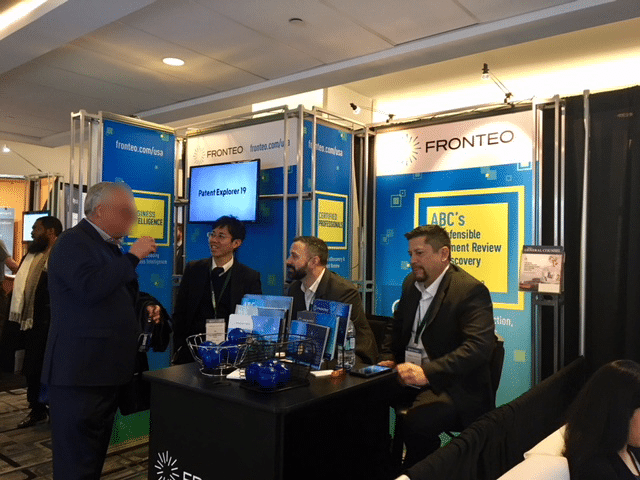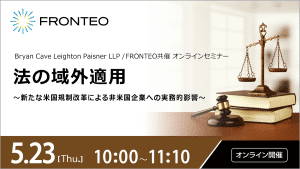
Recognizing the "ordinaryness" of eDiscovery in the litigation powerhouse America at the Legalweek New York venue
As I walked through the venue of Legal week New York 2019, I felt that the time for all companies to appeal the performance of the tool alone is over, and it is time to launch it as a platform, and the maturity of the market is increasing. was. eDiscovery is no longer a special thing, it seems to be a "normal" process that is essential to proceeding with proceedings. An increasing number of companies are incorporating predictive coding technology *, which has been attracting attention as one of FRONTEO's strengths, into their solutions, and each company is competing with technological innovation.Under such circumstances, new technologies are being created one after another, and in particular DISCO, Everlaw, and CloudNine were actively demonstrating their respective platforms at their booths.Hidden in company-wide eDiscovery service (DISCO) utilizing the cloud and dark data (electronic data that cannot be easily searched, such as voice data and video data, data recorded in foreign languages, conversations in chat, etc.) Visitors seemed to be enthusiastic about demonstrating the dangers, their countermeasures (Everlaw), and the new product group (CloudNine), which enables the eDiscovery process to be carried out end-to-end. I will. * Predictive Coding: An automatic sorting function for sentences that are judged to be important as evidence.The reference is Predictive Coding by the artificial intelligence "KIBIT" originally developed by FRONTEO (Reference: YouTube https://youtu.be/MWHlJpTFW2E)Machine learning that has passed the dawn and entered the popularization period
Many solutions that utilize AI have already appeared in the United States and Japan, but it is no longer just "how much effect can be achieved by using machine learning, how can it be used", but also "costs during learning". I think that the situation has advanced to the stage of asking how to apply it toward the popularization period (actual utilization), such as "how is it and what part of which business flow is used?" FRONTEO is no exception, and we are developing and providing document review tools aimed at reducing the burden on document review workers in eDiscovery, improving efficiency, and improving the quality of reviews. The developed AI "KIBIT" is installed.Taking the review tool "KIBIT Automator" introduced at the FRONTEO booth at Legal week New York 2019 as an example, the teacher data provided by the client (mainly the lawyer's office) ("Find such a document" KIBIT learns "I want" or "This is irrelevant" data).After performing morphological analysis, weighted calculation, and multiple optimizations on those teacher data, the document to be reviewed is taken in, and the morphological analysis and scoring are performed for review. However, the reviewer must actually read the document, such as finding a document that does not need to be reviewed, reducing the amount of review itself, or highlighting the part that requires special attention when it is sent to review. Ingenuity has been made to reduce the amount of text.As a result, it is possible to dramatically speed up the amount that can be reviewed manually (depending on the proficiency and skill of the reviewer).The cost and duration of document reviews, the volume of reviews, and the review speed and skills of reviewers are always a concern for our customers and lawyers' offices. By utilizing KIBIT Automator, it is possible to shorten the time required for reviews, and it will be possible to provide document reviews with quality that does not depend on the skill and fatigue level of the reviewer.
Articles in the same category

[Online seminar held on 5/23] Extraterritorial application of law - Practical impact of new US regulatory reforms on non-US companies -

Analyzing the classification results of sarcopenia-related papers by AI - I tried using paper search AI -

[Online seminar held on 5/30] Practical techniques for legal due diligence for M&A

[5/31 15th Fraud Countermeasures Study Session] [Must-see for compliance personnel] Mass media response in the event of a crisis

[Online seminar held on 5/9] New framework and practical outlook for European foreign investment regulations - Explanation of the European Commission's new regulation proposal and the regulatory environment of major countries -

[Real seminar held on 4/18] “Crisis management proposed by a competition law/consumer law boutique firm” ~Risk management to avoid a “crisis”~

Exploring patient stratification biomarkers for IgA nephropathy using AI: Overcoming bias with AI

Searching for therapeutic targets for pancreatic cancer - I tried using paper search AI -

Parkinson's disease - Analyzing drug discovery targets using paper search AI




